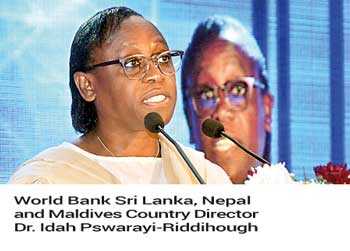Tuesday Feb 24, 2026
Tuesday Feb 24, 2026
Thursday, 10 October 2019 02:44 - - {{hitsCtrl.values.hits}}
By Uditha Jayasinghe
Inroads made by fintech will push stakeholders to redraw the roadmap for the banking industry, which would require focus on increasing the agility of banks, improving financial inclusion and accelerate development, an official said.
World Bank (WB) Sri Lanka, Nepal and the Maldives Country Director Dr. Idah Pswarayi-Riddihough delivering the keynote address at the inauguration of the Association of Professional Bankers’ 31st Anniversary Convention titled ‘Challenge of Disruptive Change – Together Towards Tomorrow’, noted that the banking industry is rapidly evolving as new trends and disruptive technologies continue to reshape the sector. 
Fintech players are challenging the status quo with new operating models. They are leveraging digitalisation in different areas (compliance, accountability, transparency, and risk management) to provide a tailored client-experience for their customers, she said.
“In this environment, banks need to redraw the roadmap for their industry. And, yes, they will need to collaborate as well as compete with the new fintech entrants. The World Bank’s client countries have been asking how these technological advances could support their development and what the appropriate institutional framework to support these possibilities is.
“The Bali Fintech Agenda, jointly developed by the World Bank and the IMF, is a response to this request. This is an agenda where both institutions have committed to leverage their expertise to provide client governments with technology-based solutions.”
Stories across developing countries have made it crystal-clear that Fintech is transforming core pillars of the financial services industry: transactions and payments; lending and credit; as well as retail savings, investment, and insurance. The Country Director pointed out fintech comes with several risks that need to be addressed, and banks can play a leading role in helping mitigate these challenges.
“We must ensure that the fast speed of Fintech transactions does not translate into a weaker ability to operate and track cross-border transactions, or into weaker data privacy and cybersecurity safeguards. When we look at the broader picture, we find that mobile phone connectivity and web traffic is growing.
“According to GSMA, over 70% of the population has a mobile connection, and 90% have 3G mobile network coverage. Smartphone uptake is growing rapidly, representing almost half the unique subscribers in 2017. In other words, even though the adoption of digital financial services in Sri Lanka is relatively slower than in other countries, it is on its way.”
The challenge in Sri Lanka is less about the unbanked; it is more about the under-banked, especially the women. According to the International Finance Corporation (IFC), the number of individuals who reported no deposits and no withdrawals in 2017 was 31%.
And only 17% of the women were successful in borrowing from financial institutions while, in the formal market, about 80% of the borrowers have been women. Moreover, less than 15% of SMEs and less than 1% of MSMEs use any form of insurance, which leaves businesses and individuals at greater risks, she observed.
In this challenging and changing environment, the Country Director advocated that banks should be seen as development enablers. Banks can enable development through different means, such as: designing innovative loan schemes for entrepreneurs; supporting financial literacy and digital ecosystems in the development of new data-driven business models; and adopting exemplary sectoral guidelines and best practices regarding data governance and cybersecurity in order to improve trust in the digital economy.
“In times of disruptive change, we should rely on strong and agile institutions to help society transition in the best possible way. At the World Bank, we believe that the private sector has a critical role to play in supporting this transition, and that disruptive technologies can help accelerate development in the 21st century.”
“Finally, we believe that banks, all of you here today, have a critical role to play in financial inclusion, as well as in increasing access to financing for Small and Medium Enterprises. Banks also have a critical role to play in supporting remittances that can fuel growth beyond consumption, and help Sri Lanka leapfrog into the digitally-supported growth of tomorrow. You are part of the equation in Sri Lanka’s recent graduation into upper middle-income status, and you will continue to be very important for the country’s future.”